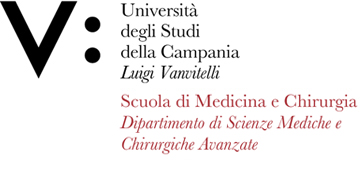Domenico PARMEGGIANI
Insegnamento di AFP GENERAL SURGERY
Corso di laurea magistrale a ciclo unico in MEDICINA E CHIRURGIA
SSD: MED/18
CFU: 1,00
ORE PER UNITÀ DIDATTICA: 20,00
Periodo di Erogazione: Secondo Semestre
Italiano
| Lingua di insegnamento | INGLESE |
| Contenuti | Al I anno di corso gli studenti seguiranno dei tirocini teorico-pratici con l’obiettivo di acquisire le basi etiche in metodologia clinica, chirurgica che rappresentano le premesse per lo sviluppo della successiva acquisizione delle abilità cliniche nelle discipline previste negli anni successivi del programma formativo. |
| Testi di riferimento | H. Ellis, R. Calne, C. Watson. General Surgery: Lecture notes. 13th Edition. Wiley Blacwell |
| Obiettivi formativi | Le esercitazioni prevedono la frequenza delle strutture ambulatoriali di Metodologia Clinica-chirurgica, le strutture di simulazione chirurgica al fine di imparare a conoscere l’approccio alle principali tecniche nelle varie discipline con particolare riguardo alle implicazioni etiche che le nuove tecnologie impongono nella scelta e nell'applicazioni alle principali procedure. Lo studente verrà messo in grado di eseguire un esame critico del contesto etico e verranno forniti cenni sulle principali procedure, chirurgiche e sulle più innovative tecnologie. |
| Prerequisiti | nessuno |
| Metodologie didattiche | Osservazione diretta dello svolgimento di ambulatori clinico-chirurgici e delle attività formative di simulazione chirurgica. |
| Metodi di valutazione | L'esame orale riguarda i principali aspetti etici-teorici delle più frequenti patologie trattate. Lo studente dovrebbe essere in grado di discutere sull'argomento ed essere in grado di connettere e di analizzare le diverse sue componenti. Lo studente deve avere conoscenza delle implicazioni etiche nelle varie patologie. Al fine di testare l'acquisizione di questa capacità allo studente verrà chiesto di risolvere un semplice problema etico orientato. Il giudizio finale è espresso in “idoneo” o “non idoneo” ed è stabilito durante la prova orale. |
| Altre informazioni | nessuna |
| Programma del corso | Etica in Metodologia chirurgica |
English
| Teaching language | English |
| Contents | In the first year of the course, students will follow theoretical-practical internships with the aim of acquiring the ethical foundations in clinical and surgical methodology which represent the premises for the development of the subsequent acquisition of clinical skills in the disciplines envisaged in the subsequent years of the training programme. |
| Textbook and course materials | H. Ellis, R. Calne, C. Watson. General Surgery: Lecture notes. 13th Edition. Wiley Blacwell |
| Course objectives | The exercises include attendance at clinical-surgical methodology clinics, surgical simulation facilities in order to learn the approach to the main techniques in the various disciplines with particular regard to the ethical implications that new technologies impose on the choice and applications to the main surgical procedures. The student will be able to carry out a critical examination of the ethical context and will be provided with information on the main surgical procedures and the most innovative technologies. |
| Prerequisites | nessuno |
| Teaching methods | Direct observation of the carrying out of clinical-surgical clinics and surgical simulation training activities. |
| Evaluation methods | The oral exam concerns the main ethical-theoretical aspects of the most frequent pathologies treated. The student should be able to discuss the topic and be able to connect and analyze its different components. The student must have knowledge of the ethical implications in various pathologies. In order to test the acquisition of this ability the student will be asked to solve a simple ethical problem. The final judgment is expressed as "suitable" or "unsuitable" and is established during the oral test. |
| Other information | nessuna |
| Course Syllabus | Ethics in Surgical Methodology |








